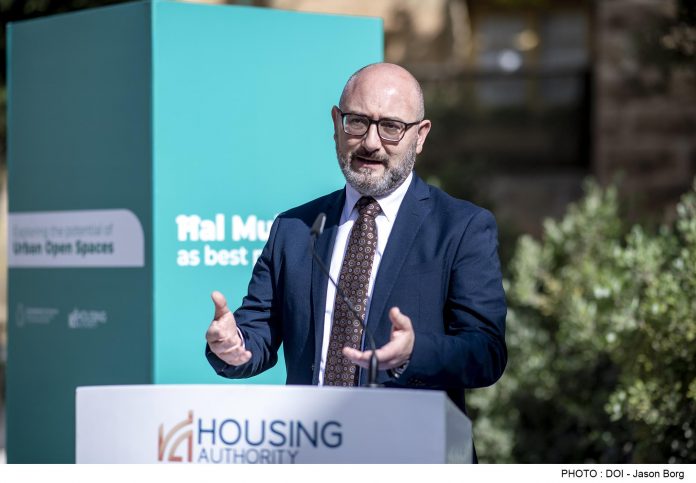Minister for Social Accommodation Roderick Galdes announced a study carried out in collaboration with the University of Malta and the Żebbuġ Local Council. The research carried out tackles residents living in the social housing of Ħal Mula and analysed how this community uses the open spaces collectively.
“When I heard about the initiative of Ħal Mula’s residents coming together to grow vegetables and fruits, I was drawn to this area. In its infancy, this initiative reflects the character and the beautiful sense of community that exists. We are in the presence of a community which is evidently alive”, said the minister.
He also stressed the importance of including open spaces in social accommodation which allow the community to meet its needs, both essential and recreational. “The government cannot take decisions on people’s lives without consultation. We talked to the residents and listened to the existing needs. Together with the Housing Authority, in this study we included the local council as well as the Faculty of the Built Environment from the University of Malta”, continued the minister. He then went on to explain how this research will lead to the master plan regarding future regenerations in social accommodation blocks as well as a design that promotes more involvement of residents in public spaces.
Minister Roderick Galdes concluded by saying that the ministry has made a revolution in the field of housing and in the definition of housing – a revolution in the sense that a project would be sensitive to the community’s reality and build on all that is good among the residents.
Dr Rachael Marie Scicluna, a consultant within the Ministry for Social Accommodation, stressed that this collective project is based on four main principles that weave everyday life with design and sustainable development through a participatory methodology. The ultimate goal for Ħal Mula is to remain true to its architectural character whilst integrating engineering aspects so that residents have a better life. This has been done through an anthropological methodology where third year University students were taught to look at how residents use their surroundings from a cultural and practical point of view but also heard both the needs and what is successful in the area. This was done before students started designing the master plan in order to learn to instil social thinking from the very beginning. The main idea is to see how the surroundings and open spaces are improved for the near future by including more greenery around the blocks and indigenous plants, shade in the open spaces to relieve summer’s intense heat, recreational areas for everyone and footpaths that promote walking and alternative transport.
Dr Kevin Gatt, Head of the Department of Spatial Planning and Infrastructure within the Faculty of Built Environment, stressed that the pandemic has shown the importance that the environment near our homes must assist in everyday life while also serving as a space for recreation. He also reiterated how essential this project was for the students, as they had the opportunity to work on a real community. “The University’s contribution makes it relevant to society and it should give back to society such proceeds from the same investment that society makes in the education of our country. The collaboration between the academic world and that of work gives a unique perspective to move from theory to practice”, stated Dr Kevin Gatt. “This participation shapes the entity as well as the academics and students who are working on this project. The dialogue the students had with the residents shows that we care about their ideas, and that we value them and that it is possible to implement them in the design.”
Żebbug Councillor Steve Zammit Lupi stressed the importance of collaboration between the government, the University and local councils when it comes to planning and the environment. He also praised how this study is a clear example of how they can work together.










